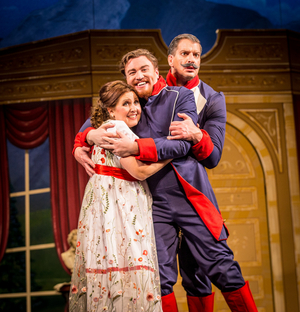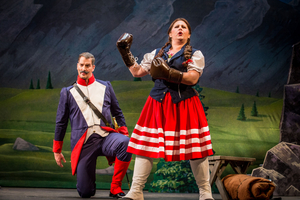Review: LA FILLE DU REGIMENT at Winter Opera St. Louis

Winter Opera St. Louis continues its 13th season with a most charming production of Gaetano Donizetti's comic La fille du regiment (The Daughter of the Regiment). This work first appeared in 1840 and it soon became enormously popular. It has remained in the operatic canon ever since.
Winter Opera, under the leadership of Gina Galati, has become a true treasure in St. Louis and it is set like a jewel in the elegant, comfortable Viragh Center on the Chaminade Campus on Lindbergh. This is the most acoustically sublime venue in all the city--a perfect place to enjoy opera.
La fille du regiment is the third Donizetti opera the company has done, coming after their Lucia di Lammermoor (2014) and L'elisir d'amore (2018). The story is as simple and contrived, as improbable and surprising, as sweetly romantic as that of any comic operetta. There is a burlesque quality to it; it might be the plot of a piece by Gilbert and Sullivan. W. S. Gilbert did, in fact, write a parody version of it (La Vivandière) in 1864. The Winter Opera production is sung in French, with all spoken dialogue in English.
The story is set in the Swiss Tyrol during a pause in the Napolonic wars. We meet the Marquise of Berkenfield and her steward Hortensius on their way home to their castle. They are alarmed by the presence of French troops in the area. Sgt. Sulpice, leader of the French 21st regiment, assures the Marquise that she is safe.
The lovely young Marie appears. Marie was found as an abandoned baby on a battlefield. She was christened on the spot and adopted by "le vingt-unième" ("the 21st"). She has been raised by the entire regiment, so every man of them is her father. Now she is their canteen girl or provisioner. This role of "vivandiere" is a long-honored one, both in wars and on the stage; it includes, of course, Brecht's Mother Courage. But Marie is far less grim than that Brechtian survivor. She's a delight, beloved of all. She's especially beloved of Tonio, a young Tyrolean, who recently saved her from a mountain-climbing fall. He's awash with love for her--and she for him. But to wed her he must ask the consent of every one of her many "fathers".
Sgt. Sulpice had, so long ago, found a letter with the abandoned baby--a letter that he just happens to have with him. It reveals to the Marquise that her long-lost niece has at last been found! The Marquise whisks Marie off to her castle and endeavors to train her out of the military manner she's acquired. Marie is more than a "tom-boy", she's a "tom-grenadier". She'd much rather march than waltz. Her favorite song is the regimental anthem. But the Marquise wants to marry Marie to a cousin, the Duke of Krakentorp, so she must be polished!
For a couple centuries the theater profited from many gifted "actor/managers"--talented performers who established their own production companies. (Think David Garrick, Henry Irving, Herbert Beerbohm Tree, Sarah Bernhardt--even Laurence Olivier and Kenneth Branagh.) Well, our Gina Galati continues that tradition. Founder and General Director of Winter Opera, she now performs the role of Marie. She's a very fine coloratura soprano, and she seems to be getting younger! She's not quite une femme d'un age certain; still Ms. Galati (one would have thought) had surely outgrown the ingénue roles. But here she shines with the glow and lightness of youth. She seems, visually, almost a child in her early duet with Andrew Potter (Sgt. Sulpice), who is almost two heads taller than she. Ms. Galati's voice is most splendidly bright and clear and pure, and she's so easily capable of all those glorious Bel Canto tricks that fill the role.
Tonio, Marie's lover, is sung by Isaac Frishman. He's a sweet-voiced tenor who is utterly undaunted by this role which includes an aria that's been called "the Everest of tenor arias"--it has eight high C's! (Oops! Was that a ninth one that just flew by?)
Andrew Potter brings to the role of Sgt. Sulpice not only a towering stature (6'8"?) but also a perfect comic sense, an iconic grenadiere's moustache, and a beautiful bass/baritone voice. He's perfect in the role. (He did that delightful Dr. Dulcamara in L'elisir d'amore a couple years ago.)
The Marquise is sung by Joy Hermalyn. She too has impressive comic abilities, as well as a lovely contralto. Her face, with beautiful large features, is utterly stage-worthy.
Gary Moss plays Hortensius, the Marquise's very proper and slightly pompous steward. He's precise and beautifully comic. He seems brother to that self-important gentleman's gentleman Lutz in The Student Prince. It's an outstanding performance.
Once again scene designer Scott Loebl astonishes us with an awe-inspiring sky-scape, this time with Tyrolean alps towering over a pleasant green valley.
Costumes, by Felia Davenport, are perfect. Ah, the Napoleonic wars--the last appearance of soldiers dressed like toy soldiers! Ms. Davenport gives her men of le vingt-unième crisp tunics and kepis in a tricolour of red, white and a quite cheerful blue. The locals are, of course, in lederhosen and dirndls.
Stage director Audrey Chait manages her cast gracefully, with many touches of wit-as in the many curious and distinctly different hand-shakes when Tonio gets the blessing of each of Marie's "fathers", and in the assertively French pronunciation of two specific words: "Sergeant" (sahr-ZHAHN) and "regiment" (ray-zhee-MAHN).
It is a delightful evening in Winter Opera's long tradition of such. It played January 24 and 26.
Reader Reviews
Videos

